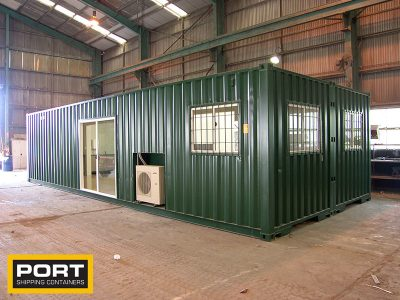Shipping containers have become incredibly versatile, serving not only as transportation units but also as storage solutions, workspaces, and even homes. Whether you're a business looking to expand your storage capacity or an individual embarking on a unique project, choosing the right shipping container is crucial. With various sizes, conditions, and specifications available, making the right choice can feel overwhelming. Here’s a guide to help you navigate the process and select the best shipping container for your business or project needs.
1. Determine Your Purpose
Before you start shopping for a shipping container, it's essential to define its intended use. Are you planning to use it for storage, transportation, or perhaps a building project? The purpose will heavily influence the type of container you need. For instance:
Storage: If you need extra storage space, consider a container that is weatherproof and secure, such as a standard 20-foot or 40-foot container.
Transportation: If you're transporting goods, ensure the container meets international shipping standards, such as an ISO-certified container.
Conversion Projects: If you’re converting a container into an office, home, or pop-up shop, you’ll need to think about insulation, ventilation, and possibly modifying the container’s structure.
2. Choose the Right Size
Shipping containers come in various sizes, with the most common being 20-foot and 40-foot lengths. The size you choose should align with your specific needs:
20-Foot Container: This size is ideal for smaller storage needs, tight spaces, or when transporting a moderate amount of goods.
40-Foot Container: A 40-foot container offers double the storage space, making it suitable for larger projects or when you need to transport a significant amount of cargo.
High Cube Containers: If you need extra vertical space, consider a high cube container, which is typically one foot taller than standard containers.
Measure the space where the container will be placed and consider what you'll be storing or building inside to determine the best size for your needs.
3. Evaluate the Condition
Shipping containers are available in various conditions, from brand new to heavily used. Depending on your budget and project requirements, you’ll need to decide on the condition that suits you best:
New or "One-Trip" Containers: These containers have only made a single trip and are practically brand new. They’re in excellent condition and are a good choice if appearance and longevity are important.
Used Containers: These containers have been in service for several years and may show signs of wear, such as dents or rust. They are more affordable and can be suitable for storage or projects where appearance isn’t a top priority.
Refurbished Containers: These have been repaired and repainted, offering a balance between new and used containers. They often come with a fresh look and extended life at a lower price point than new containers.
Inspect the container thoroughly or request detailed photos and descriptions if buying remotely. Look for signs of structural damage, rust, and the condition of doors and seals.
4. Consider Modifications
Depending on your project, you may need a container that has been modified or is ready for customization. Common modifications include:
Doors and Windows: For conversion projects, consider adding doors, windows, or ventilation systems.
Insulation: If you’re using the container as a workspace or living space, insulation is crucial for temperature control.
Interior Fixtures: Shelving, lighting, and electrical wiring are common modifications for storage and workspace containers.
Many suppliers offer customization services, or you can choose to modify the container yourself or hire a contractor.
5. Check for Certification
If you’re using the container for shipping, ensure it’s CSC (Container Safety Convention) certified. This certification indicates that the container is safe for international transport and meets all industry standards. Even for non-shipping uses, a CSC-certified container can offer peace of mind regarding its structural integrity.
6. Consider the Location and Delivery
Before finalizing your purchase, think about where the container will be delivered and how it will be placed. Shipping containers are large and heavy, so you’ll need to ensure that the delivery location is accessible and has enough space for the container.
Delivery Costs: Factor in delivery costs, as they can vary depending on distance and difficulty of access.
Site Preparation: Ensure the site is level and prepared to support the weight of the container, especially if it will be in place for an extended period.
7. Compare Prices and Suppliers
Finally, it’s essential to compare prices from multiple suppliers. Don’t just focus on the cost of the container itself—consider delivery fees, warranty options, and the reputation of the supplier. Reading reviews and asking for recommendations can help you find a reputable seller.
Conclusion
Choosing the right shipping container for your business or project involves careful consideration of size, condition, purpose, and potential modifications. By evaluating your specific needs and working with a trusted supplier, you can find a container that meets your requirements and serves as a valuable asset for years to come. Whether you’re looking for storage solutions, a unique project base, or a transport container, making an informed choice will ensure your investment is worthwhile.






